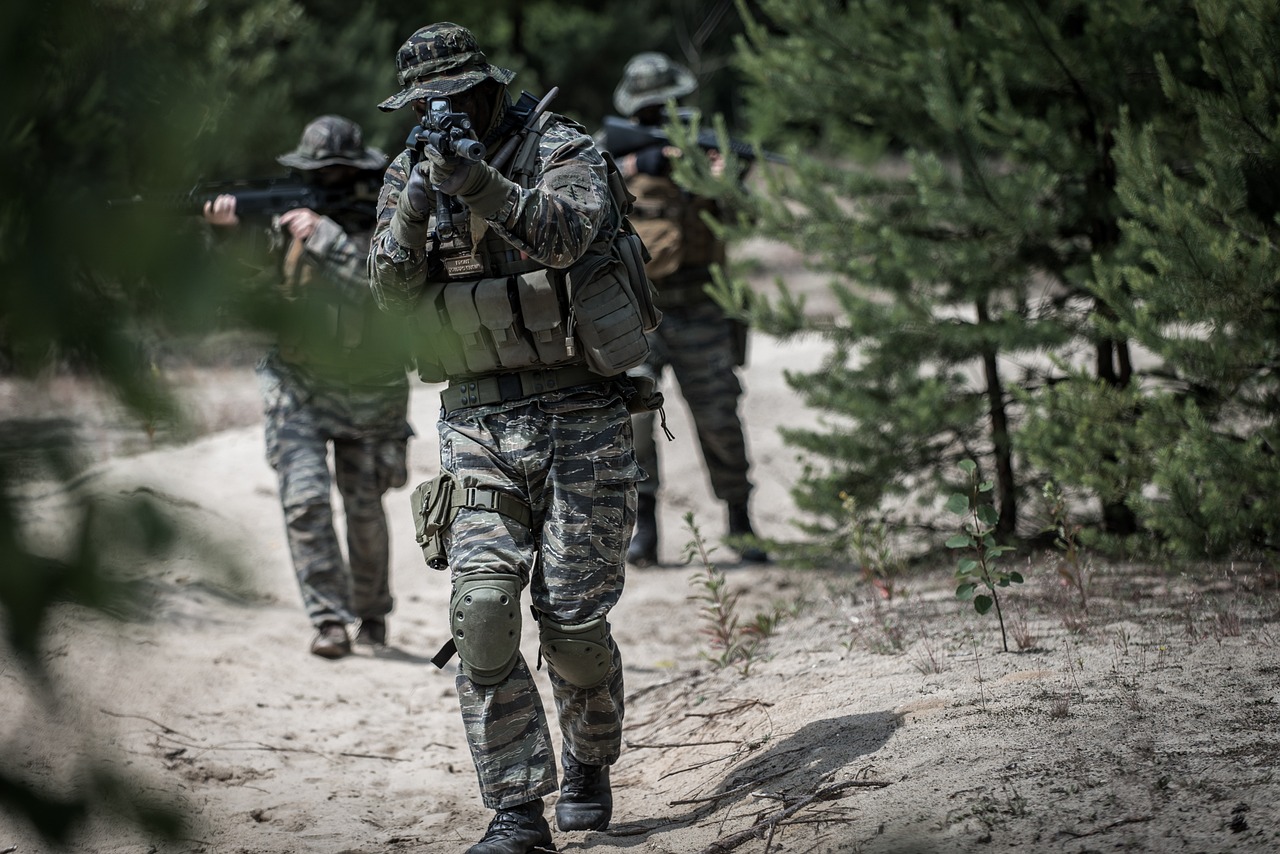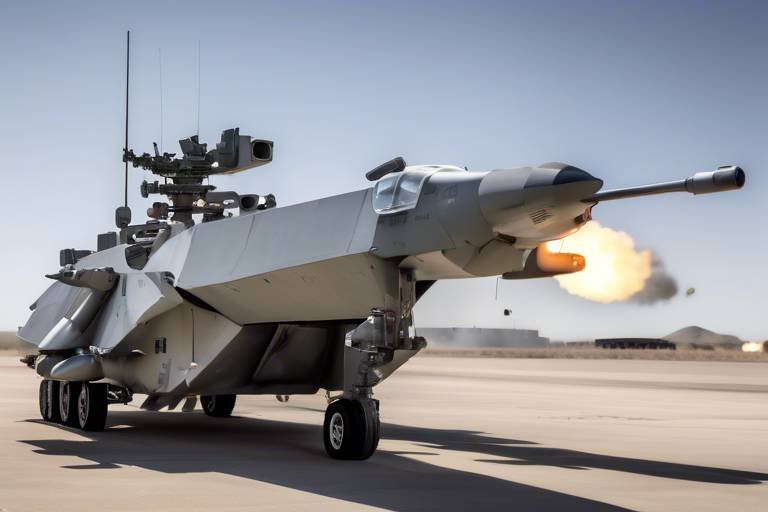Military Supply Chains - The Role of Blockchain Technology
In today's fast-paced world, the importance of efficient military supply chains cannot be overstated. These intricate networks are the backbone of armed forces, responsible for delivering everything from essential supplies to advanced equipment. However, despite their critical role, military supply chains often grapple with various challenges, including inefficiencies, lack of transparency, and security vulnerabilities. Enter blockchain technology, a revolutionary solution that promises to transform the landscape of military logistics.
Blockchain technology is not just a buzzword; it is a game-changer. By offering a decentralized digital ledger system, blockchain enhances the efficiency, transparency, and security of military supply chains. Imagine a world where every transaction is recorded in a tamper-proof manner, where accountability is built into the very fabric of the supply chain. This is the potential that blockchain holds. It can address the pressing challenges of modern defense logistics, providing innovative solutions that streamline operations and ensure that troops receive the right supplies at the right time.
As we delve deeper into this topic, we will explore the structure and key components of military supply chains, the fundamental principles of blockchain technology, and the myriad benefits that come from integrating these two domains. From enhanced transparency to improved traceability, blockchain offers a wealth of advantages that can significantly bolster military logistics.
But it's not all smooth sailing. The integration of blockchain into military supply chains comes with its own set of challenges, including technological barriers and resistance to change. Understanding these obstacles is crucial for developing effective strategies to overcome them. Through real-world case studies, we will illustrate how various military organizations are already leveraging blockchain technology to improve efficiency and security.
Finally, we will look ahead to the future trends and innovations in blockchain applications within military logistics. As technology continues to evolve, so too will the potential for blockchain to reshape the way military supply chains operate. So, buckle up as we embark on this enlightening journey through the intersection of military logistics and blockchain technology!
- What is blockchain technology? Blockchain is a decentralized digital ledger system that securely records transactions across multiple computers, ensuring that the data cannot be altered retroactively.
- How can blockchain improve military supply chains? By providing real-time visibility, enhancing traceability, and reducing fraud, blockchain can significantly increase the efficiency and security of military logistics.
- What are the challenges of implementing blockchain in military logistics? Challenges include technological barriers, resistance to change, and the need for training personnel to effectively use this new technology.
- Are there any successful case studies of blockchain in military supply chains? Yes, several military organizations have begun pilot programs that showcase the benefits of blockchain, demonstrating improved efficiency and accountability.

Understanding Military Supply Chains
Military supply chains are intricate networks that play a crucial role in ensuring that armed forces have the necessary resources to operate effectively. Imagine a complex web where every thread represents a different component—be it food, ammunition, medical supplies, or equipment—each thread must be meticulously managed to maintain the integrity of the entire system. The structure of military supply chains is not only about moving goods from point A to point B; it involves a series of interconnected processes that require precision, timing, and coordination.
At the heart of these supply chains are several key components that work in harmony. These include:
- Procurement: The process of acquiring necessary goods and services.
- Transportation: The logistics of moving supplies from suppliers to military bases and units.
- Inventory Management: Keeping track of stock levels to ensure availability without overstocking.
- Distribution: Delivering the right supplies to the right place at the right time.
However, maintaining efficiency and reliability within military supply chains is no small feat. Various challenges can hinder operations, such as:
- Geopolitical Factors: Political instability can disrupt supply routes and access to materials.
- Technological Limitations: Outdated systems can lead to inefficiencies and errors in tracking and managing supplies.
- Logistical Complexity: Coordinating supplies across different branches of the military can be daunting.
In addition to these challenges, the dynamic nature of military operations means that supply chains must be adaptable. For instance, during a conflict, the demand for certain supplies may surge unexpectedly, requiring rapid adjustments in procurement and distribution strategies. This flexibility is essential for ensuring that troops have what they need when they need it—after all, the consequences of delays can be dire.
Ultimately, understanding military supply chains is about recognizing their complexity and the vital role they play in national defense. As we delve deeper into the role of blockchain technology in enhancing these supply chains, it becomes clear that innovative solutions are necessary to overcome existing challenges and improve overall efficiency.
- What are military supply chains? Military supply chains are networks responsible for delivering essential goods and services to armed forces, including food, equipment, and medical supplies.
- Why are military supply chains complex? They involve multiple components such as procurement, transportation, inventory management, and distribution, all of which must be meticulously coordinated.
- What challenges do military supply chains face? Challenges include geopolitical factors, technological limitations, and logistical complexity, which can affect efficiency and reliability.
- How can blockchain technology help? Blockchain can enhance transparency, improve traceability, and reduce fraud within military supply chains, addressing many of the existing challenges.

The Basics of Blockchain Technology
Blockchain technology is revolutionizing the way we think about data management and transactions. At its core, a blockchain is a decentralized digital ledger that records transactions across multiple computers in such a way that the registered transactions cannot be altered retroactively. This means that once a piece of data is entered into the blockchain, it is there permanently, providing a level of immutability that is hard to achieve with traditional databases.
One of the fundamental principles of blockchain is consensus. This means that before any new transaction is added to the blockchain, it must be agreed upon by a majority of the network participants. This consensus mechanism ensures that all parties involved have a say, which enhances trust and reduces the risk of fraud. Additionally, blockchain uses cryptographic security to protect data, ensuring that only authorized users can access or modify the information. This combination of decentralization, consensus, and cryptographic security makes blockchain an attractive option for various applications, including military supply chains.
To better understand how blockchain operates, consider the following key components:
- Blocks: Each block in a blockchain contains a number of transactions. Once a block is filled, it is added to the chain of previous blocks.
- Nodes: These are the individual computers that participate in the blockchain network. Each node has a copy of the entire blockchain, which ensures transparency and redundancy.
- Miners: In some blockchain networks, miners validate transactions and add them to the blockchain. They are rewarded for their efforts, which incentivizes them to maintain the network's integrity.
The beauty of blockchain lies in its ability to provide transparency and security simultaneously. For instance, in military logistics, having a transparent view of the supply chain can significantly enhance decision-making processes. Commanders can track the movement of supplies in real-time, ensuring that troops receive what they need when they need it. Furthermore, the secure nature of blockchain minimizes the risk of tampering, which is crucial in defense operations.
However, while blockchain technology holds immense potential, it is not without its challenges. The integration of blockchain into existing systems can be complex, requiring significant changes in infrastructure and processes. Additionally, there may be resistance from personnel who are accustomed to traditional methods of operation. Overcoming these hurdles will be essential for military organizations aiming to leverage blockchain technology effectively.
In summary, blockchain technology offers a promising framework for enhancing the efficiency, transparency, and security of military supply chains. Its decentralized nature, combined with robust security measures, positions it as a key player in modern defense logistics.
- What is blockchain technology? Blockchain is a decentralized digital ledger that records transactions across multiple computers, ensuring that the data cannot be altered retroactively.
- How does blockchain enhance supply chain management? By providing transparency, security, and improved traceability, blockchain helps streamline operations and reduce fraud in supply chains.
- What challenges does blockchain face in military logistics? Challenges include technological barriers, resistance to change, and the need for significant infrastructure upgrades.

Benefits of Blockchain in Supply Chains
When we think about the logistics behind military operations, the words complex and challenging often come to mind. Military supply chains are not just about transporting goods; they involve a myriad of processes that need to function seamlessly to ensure that our armed forces are always prepared. This is where blockchain technology steps in, offering a transformative approach that enhances efficiency, security, and transparency across the board.
One of the most significant advantages of implementing blockchain in military supply chains is the increased transparency it provides. Imagine a world where every transaction, every movement of goods, is recorded in a digital ledger that is immutable and accessible in real-time. This level of visibility ensures that everyone involved, from suppliers to military personnel, can track the status of materials and equipment at any given moment. Such transparency not only fosters accountability but also aids in swift decision-making. For instance, if a shipment is delayed, military planners can quickly identify the cause and adjust their strategies accordingly.
Another key benefit is the reduction of fraud and the enhancement of trust among stakeholders. In traditional supply chains, the risk of counterfeit products or unauthorized alterations is a constant threat. However, with blockchain, each transaction is encrypted and linked to previous transactions, making it nearly impossible to tamper with the data without detection. This cryptographic security builds a level of trust that is crucial in military operations, where the integrity of supplies can be a matter of national security.
Moreover, blockchain technology significantly improves traceability. In the military context, being able to trace the journey of an item from its origin to its final destination is invaluable. For example, if a piece of equipment malfunctions, military personnel can trace it back through the supply chain to identify any issues that may have occurred during transport or handling. This ability to track assets not only mitigates risks but also ensures compliance with stringent regulations that govern military logistics.
To illustrate these benefits further, consider the following table that summarizes how blockchain enhances military supply chains:
| Benefit | Description |
|---|---|
| Increased Transparency | Real-time visibility into supply chain operations, improving accountability and decision-making. |
| Reduced Fraud | Enhanced security through encrypted transactions, fostering trust among stakeholders. |
| Improved Traceability | Ability to track assets throughout the supply chain, ensuring compliance and risk mitigation. |
In conclusion, the integration of blockchain technology into military supply chains is not just a trend; it’s a revolution that promises to redefine how logistics are managed in defense operations. By enhancing transparency, reducing fraud, and improving traceability, blockchain provides a robust framework that can address many of the challenges faced in military logistics today. As we continue to explore this innovative technology, the potential for further advancements in efficiency and security becomes increasingly apparent.
- What is blockchain technology? Blockchain is a decentralized digital ledger that records transactions across multiple computers, ensuring that the data cannot be altered retroactively.
- How does blockchain improve military supply chains? It enhances transparency, reduces fraud, and improves traceability, allowing for better management and accountability.
- Are there any challenges in implementing blockchain? Yes, challenges include technological barriers, resistance to change, and the need for training personnel in new systems.

Enhanced Transparency
In today's fast-paced military operations, transparency is not just a luxury—it's a necessity. Imagine a world where every component of the supply chain is visible in real-time, where decision-makers can track the journey of supplies from the manufacturer to the battlefield. This is where blockchain technology steps in, revolutionizing the way we perceive transparency in military logistics. By leveraging a decentralized digital ledger, blockchain ensures that every transaction is recorded and accessible to authorized personnel. This level of visibility enhances accountability, allowing military leaders to make informed decisions based on accurate data.
With blockchain, the traditional barriers of communication and information sharing are dismantled. No longer do military personnel have to rely on outdated systems or incomplete data. Instead, they can access a live feed of supply chain activities, which includes details such as shipment locations, delivery statuses, and even the condition of supplies. This real-time access not only speeds up the decision-making process but also reduces the risk of miscommunication that could lead to operational delays or resource shortages.
Furthermore, the inherent immutability of blockchain records means that once a transaction is logged, it cannot be altered or deleted. This feature is crucial for military operations where accuracy is paramount. For example, if a shipment of ammunition is delayed, the blockchain ledger will reflect the exact timestamp of when the delay occurred, who was responsible, and what actions were taken in response. This level of detail can be invaluable during audits or investigations, ensuring that accountability is upheld at all levels.
In addition to improving accountability, enhanced transparency through blockchain can also foster better collaboration among various stakeholders. Military logistics often involve multiple parties, including suppliers, transporters, and military personnel. With blockchain technology, these stakeholders can share a single version of the truth, reducing discrepancies and misunderstandings. Imagine a scenario where a supplier can directly update the status of a shipment, and all relevant parties are notified instantly. This seamless communication can lead to quicker responses to issues, ultimately enhancing operational efficiency.
To sum it up, the integration of blockchain technology into military supply chains brings about a new era of transparency. With real-time visibility, immutable records, and improved collaboration, military organizations can operate more efficiently and effectively. The potential for reducing errors, enhancing accountability, and fostering trust among stakeholders cannot be overstated. As we continue to explore the implications of blockchain in military logistics, one thing is clear: enhanced transparency is not just a benefit; it is a game-changer.
- What is blockchain technology?
Blockchain is a decentralized digital ledger that records transactions across many computers, ensuring that the recorded information cannot be altered retroactively. - How does blockchain enhance transparency in military supply chains?
By providing real-time visibility into supply chain transactions and maintaining an immutable record of all activities, blockchain improves accountability and decision-making. - What are the main benefits of using blockchain in military logistics?
Key benefits include increased transparency, enhanced traceability, reduced fraud, and improved collaboration among stakeholders. - Are there challenges to implementing blockchain in military supply chains?
Yes, challenges include technological barriers, resistance to change, and the need for training personnel to use the new system effectively.

Improved Traceability
In the ever-evolving landscape of military logistics, traceability stands out as a critical element in ensuring that every asset, from ammunition to medical supplies, is accounted for at all times. With the implementation of blockchain technology, the ability to track and trace these assets has transformed from a cumbersome process fraught with potential errors to a streamlined, transparent, and secure system. Imagine a world where every movement of military supplies is logged in real-time, creating a digital trail that is both immutable and accessible. This is the promise of blockchain.
At its core, blockchain's decentralized nature allows for a real-time ledger that records every transaction or movement of goods. Each entry is time-stamped and linked to the previous one, forming a chronological chain of events that cannot be altered retroactively. This means that if a supply shipment is delayed or goes missing, military personnel can trace its journey back through the ledger, pinpointing exactly where the issue occurred. This level of transparency not only enhances accountability but also empowers decision-makers to respond swiftly to any discrepancies.
Furthermore, the ability to track supplies through blockchain technology can significantly reduce instances of fraud and mismanagement. By ensuring that every transaction is verified by multiple parties within the network, the risk of counterfeit goods entering the military supply chain is drastically minimized. This is particularly crucial in defense logistics, where the integrity of supplies can directly impact operational readiness and safety.
To illustrate the impact of improved traceability, consider the following key benefits:
- Enhanced Compliance: Military operations often require strict adherence to regulations and standards. Blockchain's transparent record-keeping ensures compliance with both internal protocols and external regulations.
- Risk Mitigation: With detailed tracking of assets, potential risks can be identified and addressed before they escalate into larger issues.
- Streamlined Processes: Automated data collection through blockchain reduces the need for manual entry, thus minimizing human error and saving time.
In conclusion, the integration of blockchain technology into military supply chains not only enhances traceability but also fosters a culture of accountability and security. As the military continues to adapt to modern challenges, the ability to track supplies with precision will be paramount in maintaining operational efficiency and effectiveness.
- What is traceability in military supply chains? Traceability refers to the ability to track the movement and history of supplies throughout the supply chain, ensuring accountability and security.
- How does blockchain improve traceability? Blockchain provides a decentralized, immutable ledger that records every transaction, allowing for real-time tracking and enhanced transparency.
- What are the benefits of improved traceability? Benefits include enhanced compliance, risk mitigation, and streamlined processes, all of which contribute to more efficient military logistics.

Challenges of Implementing Blockchain
Integrating blockchain technology into military supply chains is not a walk in the park. While the benefits are enticing, the road to implementation is riddled with challenges that can make even the most seasoned logistics experts scratch their heads. One of the primary hurdles is the technological barrier. Many military organizations operate on legacy systems that are not compatible with blockchain technology. This incompatibility can lead to significant costs and resource allocation challenges when trying to upgrade existing infrastructure.
Another major challenge is the resistance to change. In any large organization, especially in the military, there is often a reluctance to adopt new technologies. Personnel may be accustomed to traditional methods and may view blockchain as a complex and unnecessary complication. This mindset can create friction during the transition phase, making it essential for leaders to foster a culture of innovation and adaptability.
Moreover, there is the issue of data privacy and security. While blockchain is known for its security features, the fact remains that military operations often involve sensitive information. Implementing a transparent system could inadvertently expose critical data to unauthorized parties. Balancing transparency with confidentiality is a tightrope that military organizations must walk carefully.
Lastly, the initial investment required for blockchain implementation can be daunting. Setting up a blockchain system involves not only technology costs but also training personnel and potentially overhauling existing processes. This investment can be hard to justify, especially when immediate ROI isn’t guaranteed. To overcome these challenges, military organizations can consider a phased approach to implementation, allowing time for training and adaptation.
In summary, while blockchain technology holds immense potential for enhancing military supply chains, the challenges of technological integration, resistance to change, data privacy, and initial investment must be addressed thoughtfully. By understanding these hurdles, military leaders can develop strategies to mitigate them, paving the way for a more efficient and secure logistics framework.
- What are the main challenges of implementing blockchain in military supply chains?
The main challenges include technological barriers, resistance to change, data privacy concerns, and the initial investment required for implementation. - How can military organizations overcome resistance to change?
By fostering a culture of innovation and providing adequate training, military organizations can help personnel adapt to new technologies like blockchain. - Is blockchain technology secure for military applications?
While blockchain offers enhanced security features, military organizations must carefully manage data privacy to protect sensitive information. - What are some potential benefits of using blockchain in military logistics?
Benefits include increased transparency, improved traceability, reduced fraud, and enhanced accountability in supply chain operations.

Case Studies of Blockchain in Military Logistics
In recent years, the military has begun to recognize the transformative potential of blockchain technology in enhancing logistics operations. Several case studies illustrate how this innovative solution has been successfully integrated into military supply chains, resulting in improved efficiency, security, and accountability. One notable example comes from the U.S. Department of Defense (DoD), which has initiated pilot programs to explore blockchain's capabilities in tracking and managing supplies. By creating a decentralized ledger, the DoD can ensure that every transaction is recorded and verifiable, significantly reducing the risk of fraud and errors in supply management.
Another compelling case study involves the collaboration between military organizations and private sector companies. For instance, a partnership between the U.S. Army and a leading technology firm has led to the development of a blockchain-based system for tracking the maintenance of military vehicles. This system not only provides real-time data on vehicle conditions but also ensures that all maintenance records are immutable and accessible. By leveraging blockchain, the Army can make informed decisions regarding repairs and replacements, ultimately enhancing operational readiness.
Furthermore, the NATO Communications and Information Agency has been exploring blockchain applications to improve logistics across allied forces. In a recent pilot project, NATO tested a blockchain solution for tracking the distribution of humanitarian aid. The results were promising, showcasing how blockchain can enhance transparency and traceability in logistics operations. By allowing all parties involved to view the same data in real-time, NATO was able to ensure that supplies reached their intended destinations without any discrepancies.
These case studies highlight the growing trend of military organizations embracing blockchain technology to address longstanding logistical challenges. As the technology matures, we can expect to see even more innovative applications emerge. The integration of blockchain not only streamlines processes but also fosters collaboration between military and civilian sectors, paving the way for a more resilient and efficient supply chain.
As we look to the future, the potential for blockchain in military logistics appears vast. The lessons learned from these case studies will undoubtedly serve as a foundation for further exploration and implementation of blockchain solutions. By continuing to invest in this technology, military organizations can enhance their operational capabilities and ensure that they are prepared to meet the challenges of modern warfare.
- What is blockchain technology?
Blockchain technology is a decentralized digital ledger that records transactions across many computers in a way that the registered transactions cannot be altered retroactively. This ensures security and transparency.
- How does blockchain improve military supply chains?
Blockchain enhances military supply chains by providing real-time visibility, improving traceability, reducing fraud, and ensuring data integrity across all transactions.
- Are there any challenges to implementing blockchain in military logistics?
Yes, challenges include technological barriers, resistance to change, and the need for training personnel to effectively use blockchain systems.
- What are some successful examples of blockchain in military logistics?
Successful examples include the U.S. Army's vehicle maintenance tracking system and NATO's humanitarian aid distribution project, both showcasing enhanced transparency and efficiency.
- What does the future hold for blockchain in military logistics?
The future is promising, with potential innovations and trends likely to emerge as military organizations continue to explore and integrate blockchain solutions into their logistics operations.

Collaborative Initiatives
In the ever-evolving landscape of military logistics, collaboration between various stakeholders has become essential for harnessing the full potential of blockchain technology. Military organizations, private sector companies, and technology innovators are increasingly joining forces to explore and implement blockchain solutions that can revolutionize supply chain management. This collaborative spirit is not just about sharing resources; it’s about combining expertise to tackle the unique challenges faced by military supply chains.
One notable example of such collaboration is the partnership between the U.S. Department of Defense (DoD) and various technology firms focused on developing blockchain prototypes. These initiatives aim to create a secure and efficient framework for tracking supplies and ensuring that every component reaches its destination without delay or fraud. By leveraging the strengths of both military and civilian sectors, these partnerships foster innovation and accelerate the adoption of blockchain solutions.
Another significant collaboration can be observed in joint exercises and training programs, where military personnel work alongside tech experts to understand the practical applications of blockchain in real-world scenarios. These initiatives not only enhance technical skills but also build trust and understanding between military and civilian entities. As a result, stakeholders can develop tailored solutions that address specific logistical challenges faced by armed forces.
The impact of these collaborative initiatives extends beyond immediate operational benefits. They also pave the way for long-term advancements in military logistics. For instance, as various organizations share their findings and experiences, they contribute to a growing body of knowledge that can be utilized to refine blockchain applications further. This collective intelligence is invaluable, as it allows for the identification of best practices and potential pitfalls, ultimately leading to more robust and secure supply chains.
Moreover, collaborative initiatives can help in standardizing blockchain protocols across different military branches and allied nations. This standardization is crucial for ensuring interoperability and seamless communication between various systems, which is essential in joint operations and multinational missions. By establishing common frameworks, military organizations can enhance their logistical capabilities and respond more effectively to challenges on the battlefield.
As we look to the future, the importance of collaboration in advancing blockchain technology within military supply chains cannot be overstated. The synergy between military organizations and the private sector will likely drive innovation and lead to groundbreaking solutions that enhance efficiency, security, and transparency. In a world where the stakes are high, working together is not just beneficial; it’s imperative.
- What is blockchain technology?
Blockchain technology is a decentralized digital ledger system that allows for secure and transparent transactions by recording every transaction in an immutable way. - How does blockchain improve military supply chains?
Blockchain enhances military supply chains by providing increased transparency, improved traceability, and reduced fraud, which leads to more efficient logistics operations. - What are some challenges in implementing blockchain?
Challenges include technological barriers, resistance to change, and the need for standardization across different military branches and allied nations. - Can you provide examples of successful blockchain initiatives in military logistics?
Yes, there are several case studies where military organizations have partnered with tech firms to develop blockchain prototypes, demonstrating improved tracking and accountability in supply chains.

Future Trends and Innovations
The landscape of military supply chains is on the brink of a revolution, thanks to the relentless march of technology. As we look to the future, blockchain technology is set to become a cornerstone in enhancing military logistics. Imagine a world where every transaction is not only secure but also instantly verifiable. This isn't just a dream—it's becoming a reality.
One of the most exciting trends is the integration of artificial intelligence (AI) with blockchain. By combining these two technologies, military supply chains can achieve unprecedented levels of efficiency. AI can analyze vast amounts of data generated by blockchain transactions, providing insights that can streamline operations. For instance, predictive analytics could forecast supply needs based on historical data, ensuring that troops are always equipped with what they need, when they need it.
Moreover, the use of smart contracts is another innovation on the horizon. These self-executing contracts with the terms of the agreement directly written into code could automate various supply chain processes. Imagine a scenario where a contract automatically triggers the shipment of supplies once certain conditions are met, eliminating the need for manual intervention. This not only speeds up processes but also reduces the risk of human error, a critical factor in military operations.
Additionally, the rise of Internet of Things (IoT) devices is poised to revolutionize how we track assets within military supply chains. With IoT sensors embedded in equipment and supplies, real-time data can be fed into the blockchain, providing an accurate, up-to-the-minute view of inventory and asset location. This level of visibility can significantly enhance decision-making, allowing military leaders to respond swiftly to changing conditions on the ground.
However, as we embrace these innovations, it's essential to address the cybersecurity risks that come with them. As military supply chains become more interconnected, they also become more vulnerable to cyber threats. Future innovations will need to focus not only on enhancing efficiency but also on fortifying security measures. This could involve advanced encryption methods and multi-factor authentication processes to ensure that sensitive data remains protected.
In conclusion, the future of military supply chains is bright, with blockchain technology serving as a catalyst for innovation. By integrating AI, smart contracts, and IoT, the military can achieve a level of efficiency and security that was once unimaginable. As these technologies continue to evolve, we can expect to see even more groundbreaking developments that will redefine how military logistics operate.
- What is blockchain technology? Blockchain is a decentralized digital ledger that records transactions across many computers securely and transparently.
- How can blockchain improve military supply chains? By enhancing transparency, traceability, and security, blockchain can streamline operations and reduce fraud.
- What are smart contracts? Smart contracts are self-executing contracts with the terms of the agreement directly written into code, automating processes and reducing human error.
- What role does AI play in military supply chains? AI can analyze blockchain data to provide insights that improve efficiency and predict supply needs.
- Are there any cybersecurity risks associated with blockchain? Yes, as military supply chains become more interconnected, they may be more vulnerable to cyber threats, necessitating robust security measures.
Frequently Asked Questions
- What is a military supply chain?
A military supply chain is a complex network that manages the flow of essential goods and services to armed forces. It encompasses everything from procurement and transportation to storage and distribution, ensuring that military personnel have the resources they need to operate effectively.
- How does blockchain technology enhance military supply chains?
Blockchain technology enhances military supply chains by providing increased transparency, improved traceability, and enhanced security. It allows for real-time tracking of assets and transactions, reducing the risk of fraud and ensuring that all parties involved have access to accurate, up-to-date information.
- What are the key benefits of using blockchain in military logistics?
The key benefits of using blockchain in military logistics include enhanced transparency, better accountability, and improved decision-making. With blockchain, military supply chain operations can be monitored in real-time, allowing for swift responses to any issues that may arise.
- What challenges are associated with implementing blockchain in military supply chains?
Implementing blockchain in military supply chains can face several challenges, such as technological barriers, resistance to change among personnel, and the need for extensive training. Overcoming these challenges requires strategic planning and collaboration among stakeholders.
- Can you provide examples of blockchain applications in military logistics?
Yes! There are several notable case studies where blockchain has been successfully applied in military logistics. These examples showcase how various military organizations and private sectors are collaborating to leverage blockchain technology, resulting in improved efficiency and security.
- What future trends can we expect in blockchain technology for military supply chains?
Future trends in blockchain technology for military supply chains may include further integration of AI and IoT, enhanced interoperability between systems, and the development of more sophisticated blockchain solutions tailored to specific military needs. The potential for innovation is vast as technology continues to evolve.



















